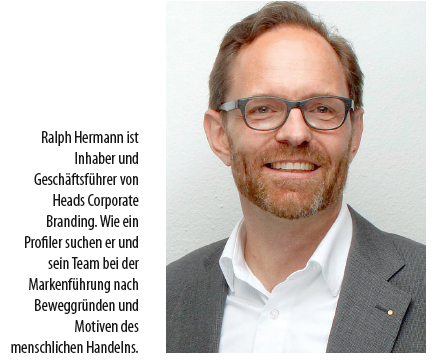The murderer is always the customer
Can the techniques of a criminal profiler also lead to tracking down the unknown customer? The corporate branding agency Heads is already in the process of using the approach of criminal technology to "convict " customers.
A corporate brand - like people - can best be captured on the basis of characteristic features and attributes. "Brand Profiler" is the name of the strategy tool used by the Zurich agency Heads Corporate Branding to "secure evidence" in the search for the true brand essence. To do this, the marketing specialists make use of the mindset and methods of criminal psychologists. To capture a brand's true personality, Heads not only interviews internal and external "witnesses at the corporate crime scene," but also explores behavioral motives of all reference groups. "These are tested for rational and emotional relevance in the market environment," as Heads Managing Director Ralph Hermann explains.

Learning from the professional
As part of the Perikom Good Practice series at the Zurich University of Applied Sciences, Heads presented its brand profiling ideas to an interested audience last week. The title of the well-attended event: "Brand Management Becomes a Crime Story." In the process, Europe's leading criminal psychologist Thomas Müller from Vienna provided insight into his thinking. The case analyst with FBI profiler training was actually able to substantiate the suspicion that brands and customers have a lot in common with criminal profiling if they have the right mindset.

"It's not what someone says that counts, but what they do," was one of Müller's key statements. In advertising, he said, many things are naturally portrayed more beautifully than they are in reality. "But one day the truth will come out on the table." Müller knows from his job: "When someone makes a decision that is important to them, they don't lie at that moment." Accordingly, from the customer's point of view, a purchase at the POS will also hardly be decisively based on argumentation from a tissue of lies.
The secret of the customer
Because all people have different needs when they decide on something, the next step is to be able to correctly define a genuine need for a product even before advertising. "As a profiler, I don't know a perpetrator at all. I can only analyze his behavior and see where he makes which decisions," Müller said, drawing the comparison that a customer who is still unknown to the supplier can be researched in exactly the same way as a profiler has to narrow down the character and intentions of a still unknown murderer.
The following applies to both killers and customers: human behavior is needs-oriented. For high-profile marketing, this means that I absolutely have to be able to reconstruct the respective needs of my customers. And I need to be able to do this at every step of their "crime" - from reading the first print ads, to the journey to the "crime scene," to the "slam" at the POS.

The profile of the brand
In the opposite case, i.e. for profiling a brand, the profiler advises that a company should in any case also go back to its roots once again. "What was the reason that this product ever existed in the first place?" Once this original need has been identified, it can be adapted to today's times and re-advertised accordingly with a rebranding.

And if the customer prepares to leave the "crime scene" without having bought anything? This is also where the "Colombo" in the head of marketing might take another look and ask: "What can an unhappy customer say about my company and its products?" The behavior of everyone involved can be seen as an additional source of information, according to Profiler. "Even the behavior of rejected customers."
Accompanying Thomas Müller's professional insights, Heads used practical examples to show how the agency is already using approaches from criminal psychologists to obtain startling insights into the uniqueness of a brand personality. Branding as a search for clues. For Heads, "all signs" indicate that we are "facing a weighty paradigm shift" in brand management. No longer should consumers fall in love with our brands, but brands should love their consumers. "No more lovebrands?" is the heretical question. Brands are thus understood as "relationship offers ". Brands are humanized and the interaction between people and brands is equated with basic principles of human relationships. And where there are relationships, there are also relationship problems - which brings us back to the educational work of the "Criminal Profiler".
Andreas Panzeri








